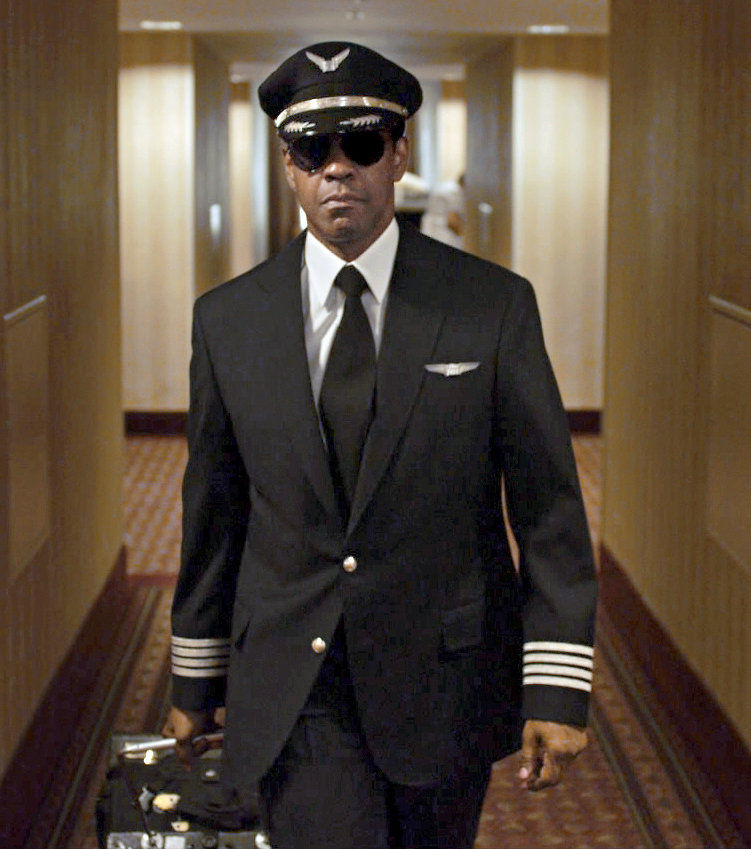The blender concoction that is Flight
- Charlie Fountaine

- Jul 24, 2016
- 3 min read
In Spike Jonze's Adaptation, (a meta-comedy/dissertation on screenwriting I will definitely visit here at some point) Nicolas Cage's Donald Kaufman muses to his brother Charlie about genre-blending -- is Casablanca a romance or a war-time thriller? It's both.

Flight contains probably the most unorthodox genre-blending I've seen come out of Hollywood. In essence it is a character study about a man's struggle to overcome his alcohol addiction -- indie snooze-fest, right? Only this time the stakes are magnified under a mile-thick glass: the man is a commercial airline pilot, which means this "indie" character piece is bookended by two taught, glued-to-your-seat sequences. The first third of the movie is an action-packed thriller that starts at 35,000 feet and ends on the ground with a plane crash. To anyone who's ever experienced a few too many bumps in an aisle seat it's one of the most harrowing sequences ever put on film. The final act is a dialogue-based emotional rollercoaster with lives on the line.
This is a storytelling risk, but risks are what Flight runs on. Not only does the movie follow a singularly intense thrill sequence with more than an hour of talking scenes that would feel at home in an independent film, but the "hero" of those scenes, Denzel Washington's Captain Whip Whitaker, is a weak, morally dubious alcoholic (a big red flag in the Hollywood development world.) Despite saving 100 lives by landing a broken plane in exceptional fashion, he is too afraid to raise his hand in an AA meeting or enter a wake to pay respects to the woman he was seeing. He even guilts a flight attendant into lying to the government investigation board on his behalf. Are we rooting for him or not?
The answer is yes. And no. At the same time. Including when Whitaker falls off the wagon in spectacular fashion right before he's scheduled to testify on the crash, only to be brought back to life by the triumphant arrival of John Goodman -- with cocaine. A scene like this might be depraved and horrifying, but Flight treats it as fun, and there's no subtlety in director Robert Zemeckis's song choice: "Sympathy for the Devil." The ambiguity in that title pervades the entire scene. In fact it's one of the few moments I can remember, from any movie, where I thought, "I'm not sure how I'm supposed to feel about this." And I didn't feel totally comfortable laughing when "[I Get High] With A Little Help From My Friends" starts playing in Whip's elevator. But I laughed anyway. Kudos for another bold risk.
Of course, these contradictions means the movie gets alcoholism right -- booze is fun until it isn't -- and credit a brilliant actor like Denzel for making most of it riveting (save a lagging scene or two in the middle) as the story throws subtle emotions at him straight out of an indie drama -- from resolve, to fear, to denial, to pure self-loathing. By the end the only resolution for an alcoholic that could please the audience is acceptance, and Whip's redemption packs an extra punch as the movie's climax. Not only is it set at a nationally-broadcast government hearing, but his getaway road is paved through one more lie about his deceased ex-girlfriend. Should he pin the vodka bottles he drank on her? With a photo of her eyes watching him (substituting for the eyes of God, a fitting theme in a movie about addiction) he finally chooses the truth, and we're left with an impressively unique conclusion: good man + in prison = happy ending.
Comments